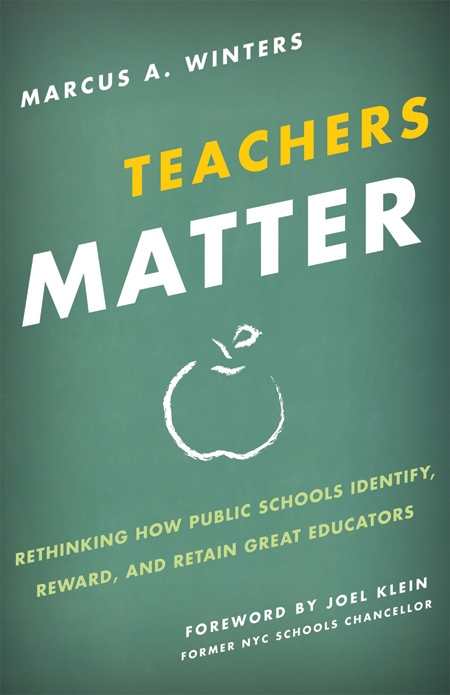Teachers Matter
Rethinking How Public Schools Identify, Reward, and Retain Great Educators
Marcus Winters’s proposal to revise how teachers are hired, rewarded, and retained will infuse the debate about educational reform with energy, if not consensus, making his book worth reading for those who care about America’s public schools.
“The many great teachers in America’s school system are excelling despite the structure of the system that employs them, not because of it. That’s not the way it should be,” says Winters. “A system that respects the difficulty of the job and the important contributions that teachers make to society is one that acts on the truth that some teachers are excellent, and some people simply don’t belong in the classroom—even if they did manage to graduate from a teaching college.”
A senior fellow at the Manhattan Institute for Policy Research, Winters is an assistant professor in the College of Education at the University of Colorado at Colorado Springs. A political scientist and economist known for his market-oriented research and education commentary, Winters wants to change how teachers are hired, evaluated, and paid. As an emerging voice in the ongoing debate about educational policy and economic reform, his book is worthy of attention despite being an imperfect analysis of the complex problem of how to improve public education.
On the one hand, Winters says, “The new widespread availability of quantitative data measuring student performance has allowed us to answer a variety of questions that we couldn’t begin to answer before.” On the other, he notes that “the vast majority of what makes a teacher effective derives from factors that are not easily observed before the teacher stands in front of a classroom … Attributes like a teacher’s patience, enthusiasm, presence in the classroom, and the ability to recognize when students are following the material and when they are falling behind are almost certainly critical to success, but such personal factors are innate to the individual and thus largely not learned in a college of education or dramatically improved upon after three to five years in the classroom.”
As a political analyst, Winters has little patience for the degrees and job security earned by teachers, and at several points in the book, one may wonder exactly what his proposed methodology measures. Regardless, because education is the only tax that citizens can vote on, Winters’s book is worth reading.
Educational reform, however, does not stop here. Teachers are part, but not all, of what works and what doesn’t work in education. Students, families, class sizes, funding mechanisms, curriculum, technology, programs, and facilities deserve equal scrutiny. Winters’s book focuses on part, but not all, of what can be done to provide quality education in our communities.
Reviewed by
Pamela Harris Kaiser
Disclosure: This article is not an endorsement, but a review. The publisher of this book provided free copies of the book to have their book reviewed by a professional reviewer. No fee was paid by the publisher for this review. Foreword Reviews only recommends books that we love. Foreword Magazine, Inc. is disclosing this in accordance with the Federal Trade Commission’s 16 CFR, Part 255.

